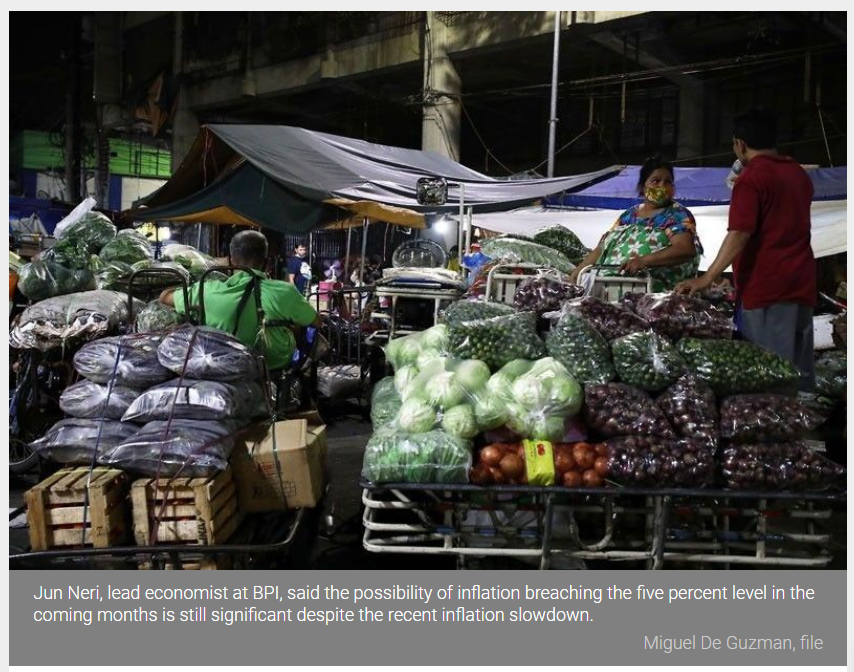Philippines: Despite March slip, inflation still seen breaching 5%
MANILA, Philippines — Ayala-led Bank of the Philippine Islands (BPI) still expects inflation to breach five percent in the coming months despite easing to 4.5 percent in March.
Jun Neri, lead economist at BPI, said the possibility of inflation breaching the five percent level in the coming months is still significant despite the recent inflation slowdown.
The last time inflation breached five percent was in December 2018 at 5.1 percent. Inflation averaged 4.5 percent from January to March, breaching the two to four percent target set by the Bangko Sentral ng Pilipinas (BSP).
Neri said base effects from oil would remain unfavorable for most of the second and third quarters, and could trigger an increase in electricity prices.
“In addition to food supply constraints, another commodity that could keep inflation above four percent in the coming months is oil, especially if global demand improves due to the distribution of vaccines,” Neri said.
Neri said the year-on-year change would reach 250 percent in April and remain significant until November if the price of oil stays at the current level throughout the year.
The lead economist of the 169-year-old bank said the Monetary Board could keep its policy rate steady in the coming months in order to support the economy amid the resurgence in COVID-19 infections.
“However, supply constraints and elevated oil prices may lead to second-round effects if these are not addressed immediately. Core inflation above four percent might force the central bank to make adjustments in its policy in order to manage second-round effects and anchor inflation expectations,” he said.
Core inflation, which excludes selected food and energy items, averaged 3.5 percent in the first three months after easing to three percent in March from 3.5 percent in February.
“To demonstrate their determination to keep core inflation from consistently breaching the headline target, monetary authorities may recalibrate the policy rate in order to maintain their independence and credibility,” Neri said.
The BSP has kept an accommodative monetary policy stance after slashing interest rates by 200 basis points, including the surprise 25 basis points cut delivered last Nov. 19, 2020.
The central bank’s aggressive easing and lowering of the reserve requirement ratio of banks, as well as unconventional measures such as the P300 billion repurchase agreement with the Bureau of the Treasury, the P540 billion provisional advance to the national government, and purchase of government securities in the secondary market released P2 trillion into the financial system.
While a short-term dip is possible, Neri said local bond yields may continue to have an upward bias as market players would likely price in the possibility of higher inflation in the coming months.
The economist said supply disruptions have kept food prices elevated and could be vulnerable to a surge in transport costs, trade restrictions, continuing threat of African swine fever (ASF) for pork producers, and weather disturbances.
Neri said the implementation of enhanced community quarantine in Metro Manila and nearby provinces could curb import demand in the short term.
“However, we still expect imports to recover further in the coming months, especially once the COVID surge is managed,” he said.
As a result, BPI sees dollar demand picking up and the exchange rate could move closer to the 49 to $1 level later this year.
“The possibility of higher inflation in the coming months may contribute further to peso depreciation. Declining returns from local investments due to high inflation could force foreign investors to sell, thereby exerting additional pressure on the peso,” Neri said.
Source: https://www.philstar.com/business/2021/04/09/2089815/despite-march-slip-inflation-still-seen-breaching-5


 Thailand
Thailand




